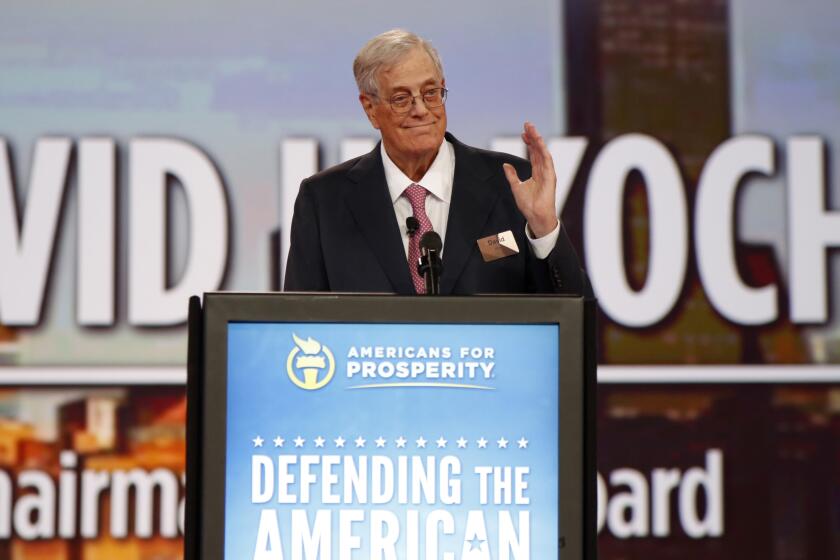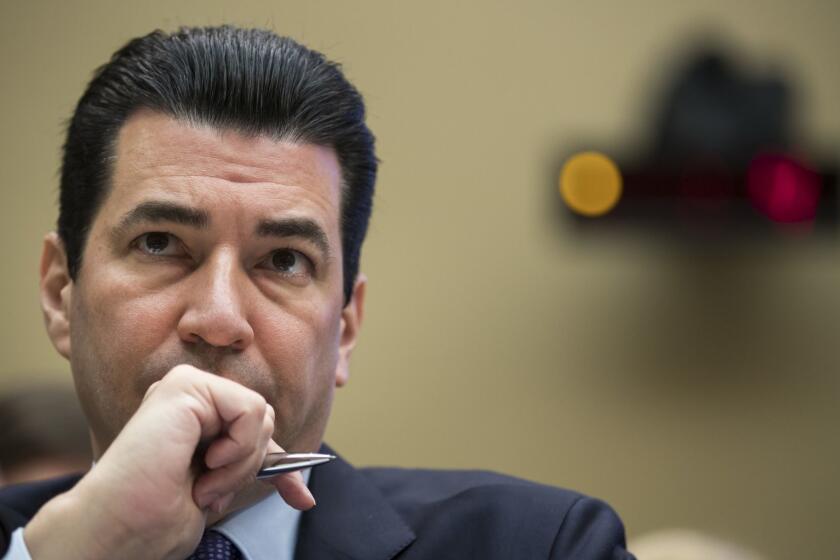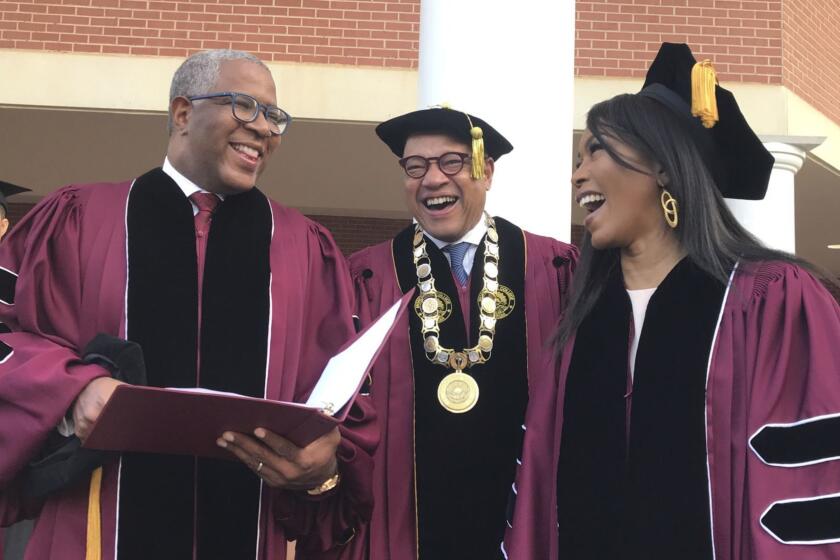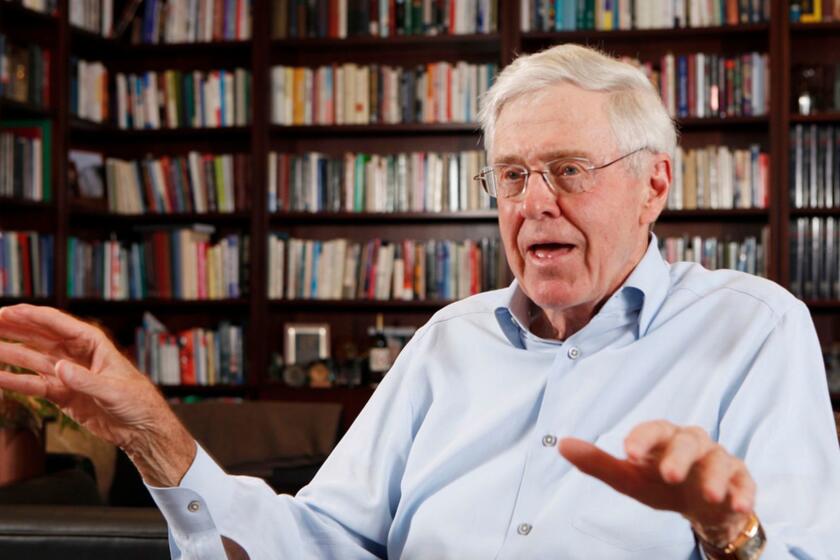Column: How MIT whitewashed the climate change denialism of a major donor, David Koch
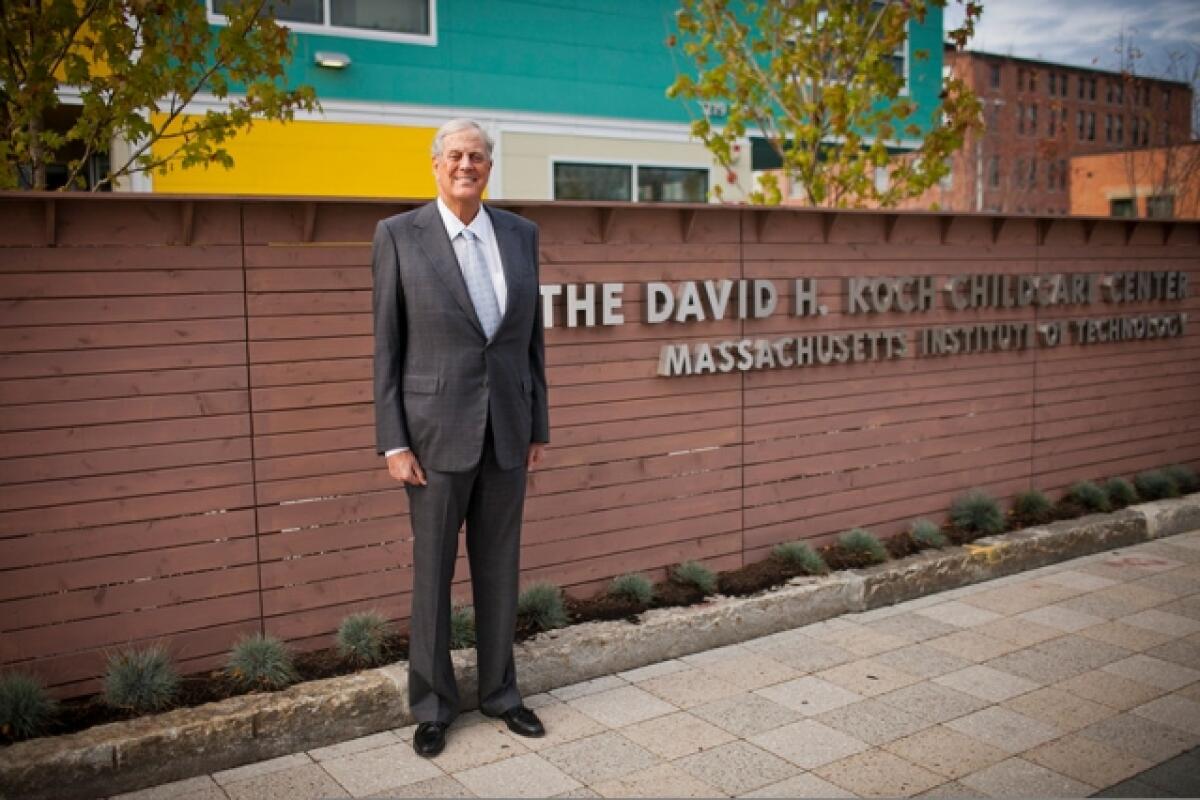
Obituary writers have been struggling for days with the task of balancing the philanthropic record of billionaire David H. Koch with his baleful influence on democratic electoral principles and the science of climate change.
Massachusetts Institute of Technology seems to have found a solution to the challenge. In its send-off to Koch published Friday, the day of his death, the university went on at length about his donations to MIT in the fields of cancer research, child care and even basketball. Of his role in suppressing the facts of climate change, fighting access to medical coverage for low-income Americans and undermining the expansion of renewable energy, MIT was completely, utterly silent.
Few humans have done so much to dismantle the public’s trust in science and to undermine political action on the climate crisis.
— MIT Ph.D. Geoffrey Supran, on David Koch
The university’s reluctance to deliver an objective assessment of Koch’s career is perhaps understandable, up to a point. Koch, like his brother Charles, was an MIT alumnus. He was a life member of the MIT Corp., the institution’s board of directors. His donations exceeded $100 million. That made him, in the university’s words, “one of the most important benefactors in MIT’s modern history.... At any given moment around MIT, beneficiaries of Koch’s gifts included faculty with endowed professorships, students with fellowships he supported — and toddlers in the childcare center he helped found.”
In other words, Koch was deeply embedded within the bosom of the MIT family. Expecting MIT to speak ill of him would be like expecting a mother to talk about her favorite child’s shortcomings. “Obituaries written for MIT News are intended to highlight a person’s life at the Institute,” an MIT spokeswoman told me by email. “For Mr. Koch, that included his time as a student and his donations to MIT for cancer research, chemical engineering, child care and the basketball team.”
But that’s an inadequate take. As an institution of higher learning, MIT has a responsibility to the truth higher than proposing an individual for sainthood merely because he lined the institution’s pockets. That’s especially so given MIT’s important role in researching climate change and disseminating the truth about it — an effort that was made immeasurably more difficult by Koch spending on the other side. (I reached out to MIT’s Environmental Solutions Initiative, which helps disseminate its research on climate change, but haven’t heard back.)
David Koch leaves a raft of right-wing policies behind him, but his real innovation was creating a dark money network.
“Few humans have done so much to dismantle the public’s trust in science and to undermine political action on the climate crisis,” says Geoffrey Supran, an MIT PhD who is the former leader of the advocacy group Fossil Free MIT and currently a research associate at Harvard. “MIT is a bastion of knowledge,” Supran says, “yet when it comes to global warming politics and the fossil fuel industry, my alma mater exhibits a shocking combination of ignorance, ambivalence and naiveté — and its press release about David Koch is a case in point.”
Supran says MIT has become embroiled in what he and his colleague Ben Franta label the fossil fuel industry’s invisible colonization of academia: “a nationwide conflict of interest with the industry that has the most to lose from action on climate change. The result is that citadels of science like MIT are going out of their way to turn a blind eye to evidence by not standing up against climate denial and delay and by refusing to divest from an industry incompatible with the science of stopping climate collapse.”
Climate change is only one of several categories in which the Koch network has had a deplorable impact. As I reported last week, David and his brother were pioneers in the mustering of “dark money” to influence American elections, chiefly through Americans for Prosperity and other organizations that are not required to disclose their donors and have few restrictions on how they can deploy funds in political campaigns. (As recently as Monday, the Kochs’ Americans for Prosperity Foundation asked the U.S. Supreme Court to uphold the confidentiality of its donors against a challenge by California.)
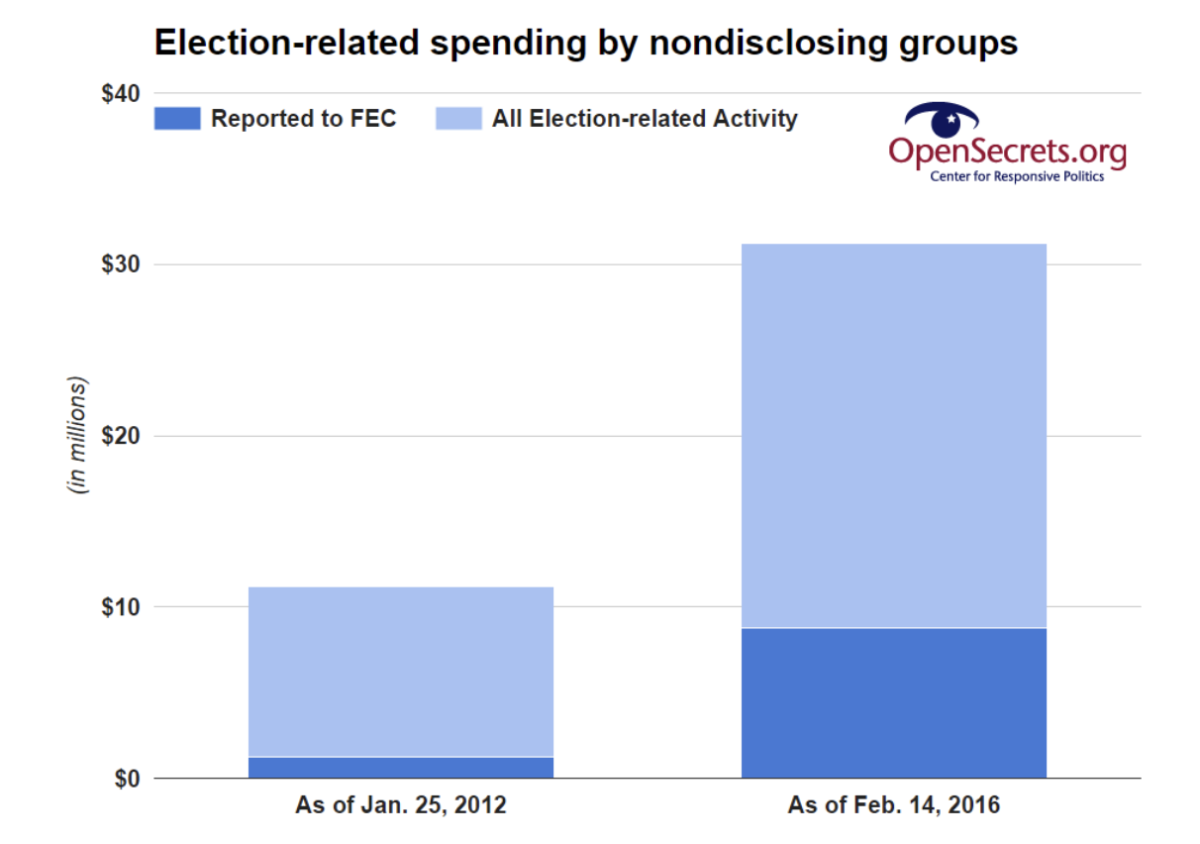
The share of election-related spending by nondisclosing groups exploded over the last decade, as more donors took advantage of the shroud in the law so expertly exploited by the Kochs.
Much of this money was spent to fight against government initiatives such as the Affordable Care Act, which was designed to bring coverage and consumer protection to middle- and low-income Americans in the individual health insurance market. Americans for Prosperity spent heavily on ads attacking the ACA during the 2014 election cycle and against Medicaid expansion — an ACA provision directed at low-income households — in states including Wisconsin and New Hampshire. (Wisconsin and 13 other states still haven’t expanded Medicaid.)
As it happens, MIT has become fully alive to the consequences of accepting what might be considered dirty money, or at least money from dirty characters. In a letter to the faculty on Friday — ironically, the day of Koch’s death and the MIT obituary, University President L. Rafael Reif disclosed that MIT had received $800,000 in donations from foundations controlled by the late sex trafficker Jeffrey Epstein.
Handing the Koch brothers and their fellow right-wing ideologues a big victory, the House on Tuesday passed a right-to-try bill that will harm patients and emasculate the Food and Drug Administration.
Reif called acceptance of the donations “a mistake in judgment” and pledged to “identify any lessons for the future, to review our current processes” and to consider “appropriate ways we might improve them.”
Reif implied that faculty members who accepted Epstein’s donations may have merely been blind to his nature: “It can be difficult to maintain a fair understanding about what individuals at MIT could have been expected to know at the time.”
Of course, there’s never been any secret about Koch’s approach to the science of climate change or his actions to undermine public understanding. So what’s MIT’s excuse for accepting his money?
MIT has come under fire before for its coziness with the Koch network. It’s “time for MIT to kick its Koch habit,” Sam Shames, a 2014 alumnus, wrote on Medium in 2016.
On this side, art dealer and former Goldman Sachs executive Robert Mnuchin, who just spent $91 million of a client’s money on a stainless steel statuette of a rabbit.
“You can acknowledge that the money that David Koch gave to help solve cancer is really good, while also acknowledging that he did other things that are really not good,” Shames told me Monday. “But just to ignore the hard part of what this person chose to do with his money — that’s not the institute I’m proud to graduate from.”
MIT’s one-sided review of Koch’s career points to the Koch network’s effectiveness at emasculating American higher education by plying academia with money. I’ve observed previously that Koch donations to universities often come with strings that can even include a say in the appointment of faculty and administrators.
MIT showed its gratitude for Koch’s blandishments by offering him positive reinforcement. As the Washington Post reported, at the 2011 dedication of the cancer facility he funded he said: “I read stuff about me and I say, ‘God, I’m a terrible guy.’ And then I come here and everybody treats me like I’m a wonderful fellow, and I say, ‘Well, maybe I’m not so bad after all.’”
One need not speculate about Koch’s motivations in funding cancer research (he was a long-term prostate cancer patient), a campus child-care center or the basketball coach’s salary in order to observe that there’s a long tradition of wealthy families using philanthropic good works to paper over the dark sides of their past.
The practice, by the way, is almost always successful. Today, vastly more Americans undoubtedly associate the Carnegie name with libraries and a concert hall than with the tycoon’s history as a steel magnate.
Here’s something you may not have known about the University of Utah: It’s been a center of scholarship in Marxian economic theory.
Henry Ford’s record of virulent anti-Semitism is almost forgotten in the glow of the work of the Ford Foundation (founded by his son Edsel). Henry Clay Frick was one of the bloodiest tycoons of the Gilded Age, with a hand in the lethal Johnstown flood and the violent Homestead strike, but how many New Yorkers think of that history while viewing the paintings by Turner and Constable in the Frick Collection, open to the public in Frick’s former mansion on Fifth Avenue?
It’s also true, however, that an institution can’t always suppress the implications of its relationships with bad actors forever. Not a few universities are trying today to come to terms with honors granted to donors or alumni whose records don’t bear the scrutiny of the present. “My fear is that if MIT does not speak out soon,” Shames wrote in 2016, “we will one day look back at anything named Koch with the same unease and shame as Princeton and Yale now view their buildings named after documented racists like Woodrow Wilson and John Calhoun.”
MIT already has suffered the consequences of its ties to Epstein. These include the resignation of at least two associates of the Media Lab, which accepted much of the donations, who don’t want to be associated with the lab any further.
But whether the institution really will apply lessons it learns from the Epstein case more broadly is an open question. Certainly there was no evidence in its encomium to Koch. Rather, its statement seemed designed to upend Mark Antony’s observation in Shakespeare’s “Julius Caesar” that “the evil that men do lives after them; the good is oft interred with their bones.” What MIT tried to do was suggest that the good Koch did for the institution’s endowment should live after him, while interring the evil with his bones.
Shames says he was especially struck by the final sentence of the MIT obituary, which called Koch “truly a son of MIT who made the Institute a better place.”
“Essentially, they were willing to let him fund an agenda that makes the world a worse place,” Shames observed, “in exchange for making MIT better. As an alumnus, that makes me really sad.”
More to Read
Inside the business of entertainment
The Wide Shot brings you news, analysis and insights on everything from streaming wars to production — and what it all means for the future.
You may occasionally receive promotional content from the Los Angeles Times.
